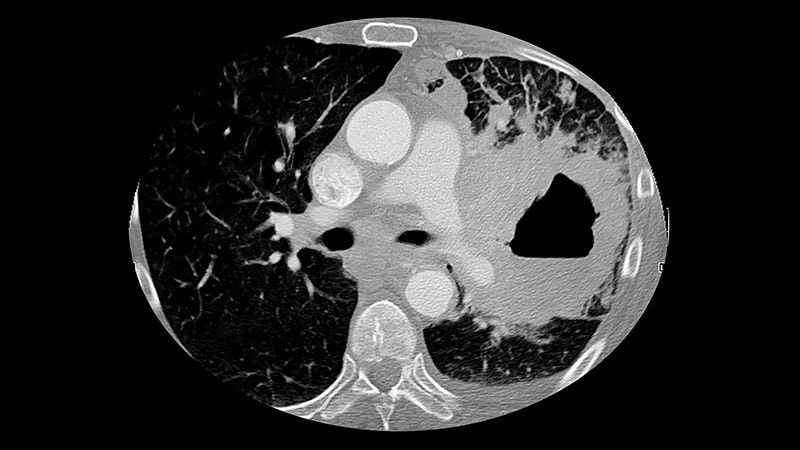Osimertinib Plus Chemo Improves PFS in First-Line EGFR-Mutated NSCLC
Core Concepts
Combining osimertinib with platinum-based chemotherapy improves progression-free survival in EGFR-mutated NSCLC.
Abstract
The FLAURA2 trial presented interim results showing that adding platinum-based chemotherapy to osimertinib in the first-line treatment of EGFR-mutated advanced non-small cell lung cancer (NSCLC) significantly improved progression-free survival (PFS). Experts raised concerns about overall survival benefits and toxicity. The study aimed to explore the potential additive benefit of osimertinib and chemotherapy in patients with non-squamous NSCLC. The combination therapy demonstrated a higher objective response rate, longer duration of response, and significant improvements in PFS compared to monotherapy. The study highlighted the importance of understanding resistance mechanisms and managing toxicity for the future role of this combination therapy.
Osimertinib Plus Chemo Ups PFS, Toxicity in First Line
Stats
Combining osimertinib with platinum-based chemotherapy achieved statistically significant and clinically meaningful improvement in PFS over osimertinib monotherapy.
Patients receiving the combination showed significant improvements in PFS — 25.5 months vs 16.7 months (hazard ratio [HR], 0.62; P < .0001).
The combination led to higher rates of grade 3 or higher adverse events overall — 64% vs 27%.
Quotes
"The combination regimen does appear to offer a benefit, it may come at a steep cost." - Yi-Long Wu, MD, PhD
"Questions of sequencing remain." - Mohana Roy, MD
"Further toxicity and overall survival data will clarify the future of the combination." - Christian Rolfo, MD, PhD, MBA
Key Insights Distilled From
by Liam Davenpo... at www.medscape.com 09-12-2023
https://www.medscape.com/viewarticle/996370
Deeper Inquiries
What are the potential implications of the combination therapy on overall survival in EGFR-mutated NSCLC?
The potential implications of the combination therapy on overall survival in EGFR-mutated NSCLC are currently uncertain. While the FLAURA2 trial showed a significant improvement in progression-free survival (PFS) with the addition of platinum-based chemotherapy to osimertinib, the data on overall survival are still immature. It is crucial to await further analysis to determine whether the combination therapy will offer an overall survival benefit over osimertinib monotherapy. If the combination does not demonstrate an overall survival advantage, patients may have experienced chemotherapy-related side effects without gaining a survival benefit, raising questions about the cost-benefit ratio of the treatment approach.
How can the toxicity associated with the combination therapy be effectively managed to maximize patient outcomes?
To effectively manage the toxicity associated with the combination therapy of osimertinib and platinum-based chemotherapy in EGFR-mutated NSCLC, several strategies can be implemented. Close monitoring of patients for adverse events, especially grade 3 or higher toxicities, is essential to promptly address any issues that may arise. Dose modifications or interruptions may be necessary to manage toxicity while maintaining treatment efficacy. Supportive care measures, such as antiemetics, growth factors, and symptom management, can help alleviate treatment-related side effects and improve patient quality of life. Additionally, patient education and communication about potential side effects and their management are crucial to ensure adherence to treatment and early intervention when needed.
How might understanding resistance mechanisms impact the future development of treatment strategies for EGFR-mutated NSCLC?
Understanding resistance mechanisms in EGFR-mutated NSCLC is vital for the future development of treatment strategies. Resistance to EGFR tyrosine kinase inhibitors (TKIs) remains a challenge in the management of advanced NSCLC, necessitating the exploration of combination approaches to overcome resistance and improve outcomes. By elucidating the mechanisms underlying resistance, such as secondary mutations in the EGFR gene or activation of alternative signaling pathways, researchers can identify novel targets for therapy. This knowledge can inform the development of targeted therapies, immunotherapies, or combination regimens that address specific resistance mechanisms, potentially leading to improved treatment responses and prolonged survival for patients with EGFR-mutated NSCLC. Additionally, understanding resistance mechanisms can guide the sequencing of therapies and help personalize treatment approaches based on individual patient characteristics and tumor biology.
0
